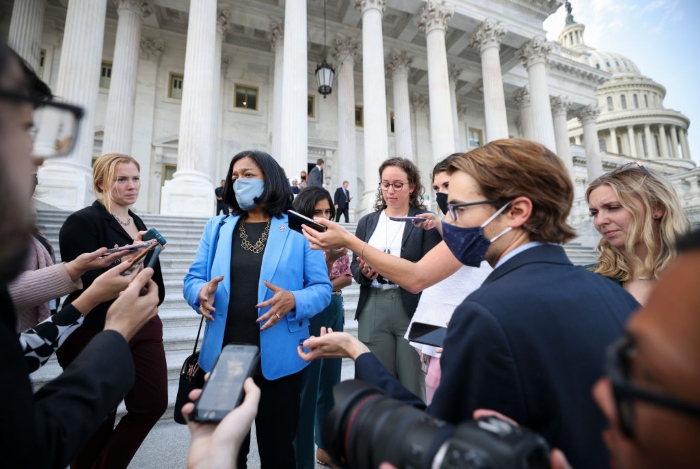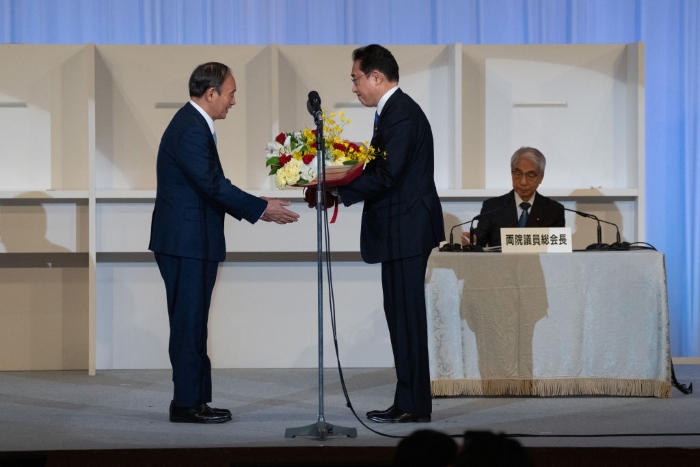| | |  | BY SAM STEIN | Presented by the American Cancer Society Cancer Action Network | With help from Renuka Rayasam and Tyler Weyant
| 
Rep. Pramila Jayapal (D-Wash.) speaks to reporters as she leaves the U.S. Capitol. | Kevin Dietsch/Getty Images | PROGRESSIVES’ PILGRIMAGE — It is an article of faith among most Democrats that progressives will always cave to their more centrist colleagues when the time comes to vote on major legislation. And yet, on the brink of a historic bout of congressional chaos, the exact opposite appears to be happening. Over the past few days, the left has been galvanized by the idea of voting down the bipartisan infrastructure package unless their moderate counterparts first provide some commitments on the party-line social spending and climate bill. That sentiment could change at any moment. But there’s one reason it might not: Instead of facing the usual chastisement from prominent Democratic-leaning pundits, progressives are being cheered on for their intemperance. “Kill the Bill,” Josh Marshall of Talking Points Memo wrote this morning. New York Times columnist Jamelle Bouie tweeted his endorsement: “Either both bills pass or neither does.” For some in the party, this is legislative nihilism. Shooting the hostage may work as a concept in a Keanu Reeves movie. But in Washington, it is considered a self-destructive hissy fit. For progressives, however, it’s been lovely if a bit bewildering to watch. “It’s a beautiful sight,” Rebecca Katz, a longtime progressive operative, said of liberal lawmakers linking arms, grabbing the detonator, and pointing menacingly at the BIF. “This is the most together they’ve been. I mean, I can’t remember the last time we’ve seen something like this. … I’ve been retweeting Jonathan Chait and Hillary Clinton people today. It’s very confusing.” During the Clinton and Obama years, progressives routinely swallowed their pride, as Katz noted. The most classic case came during the passage of the Affordable Care Act. Back then, the progressive ecosystem rallied around the public option as a litmus test of the bill’s intellectual virtue. Then they agreed to pare it back so that states could opt out, then so states could opt in. Then they dropped the concept entirely, replacing it with a provision that would have opened up Medicare coverage for those 55 and older. And when that didn’t get the votes, they begrudgingly moved forward without it … with one exception. Rep. Dennis Kucinich (D-Ohio), a lifelong single payer advocate, was the last progressive holdout on the ACA. Because a number of centrists were already opposed to the bill, his vote truly mattered. To win it, Barack Obama brought him on Air Force One and called him onstage at an event in Cleveland, where the crowd encouraged the congressman to “vote yes.” Kucinich did. The bill passed. And, ultimately, Democrats were and are grateful for it. So why is that model not happening today? Why aren’t Rep. Pramila Jayapal and the squad bending to moderate senators and centrist House counterparts? Welcome to POLITICO Nightly. Reach out with news, tips and ideas for us at nightly@politico.com. Or contact tonight’s author at sstein@politico.com and on Twitter at @samstein.
| |
| | A message from the American Cancer Society Cancer Action Network: The National Breast and Cervical Cancer Early Detection Program (NBCCEDP) provides lifesaving cancer screenings in low-income communities, but fewer than 2 in 10 eligible individuals received breast or cervical cancer screenings through this critical safety net program. Lawmakers must take action to end this divide in access to cancer prevention, early detection and treatment. Increased funding for the NBCCEDP will help more individuals get the cancer care they need—and help end this alarming divide. | | | BLAME (OR THANK) OBAMACARE — For starters, the progressive universe is markedly different from the one that existed in 2010, in large part because of Obamacare and its aftermath. The progressive lawmakers most vocal about stopping the infrastructure bill unless they get assurances on the reconciliation bill first were elected after the passage of the ACA. The progressive writers who covered the Obamacare debate now find themselves leading newsrooms or in prominent perches at opinion pages. And the prevailing view among progressives of that experience is not just that, ultimately, a good legislative outcome was reached, but that the party made perverse, perhaps unnecessary, tradeoffs that did political damage to the law and to the Democratic Party. The public option was, after all, a popular component of the bill. But the accommodations went beyond that. The bill’s authors also delayed the distribution of subsidies to buy insurance to, in part, help keep the price tag under $1 trillion, a symbolic number that bothered moderates. That delay meant that no one felt one of the most tangible, positive, impacts of the law for years. As one operative who worked on the bill put it: “That was suicidal.” The progressive faction today looks at that history and asks: Why, exactly, should we do that again? The reconciliation package is popular. It is the Biden agenda. If its passage is materially threatened because moderates — having been satiated by getting the infrastructure deal done — no longer feel compelled to support it, then the party will once again be taking the suicidal path. Or so progressives believe. “Preserving the Biden political strength and Democratic brand heading into 2022 seems to be held most strongly by progressives here,” said Faiz Shakir, a longtime progressive operative and Bernie Sanders’ 2020 campaign manager. “Frankly, it should be held more broadly.” Progressives say they feel no compulsion to fold. Nor do they feel they’ve been pressured to do so by the Biden White House. Collectively, they believe their position is essential in preventing Democratic self-sabotage — even as others question the sanity of risking both bills for the benefit of one.
| | PUNDIT IN THE ARENA — In the aftermath of the Jan. 6 insurrection, Matthew Dowd, chief strategist for George W. Bush’s 2004 reelection campaign and current television anti-Trump pundit, started thinking about running for office. His resolve built all summer as Texas GOP leaders led special sessions focused on conservative priorities. But Dowd told Nightly's Renuka Rayasam he only “recently” decided to run for Texas lieutenant governor — as a Democrat. Dowd had started his career running campaigns for Democrats, including former Texas Lt. Gov. Bob Bullock, but became a Republican and started working for Bush in 1999 . On Tuesday night, Dowd filed paperwork that would allow him to start raising funds for his campaign, and he opened his campaign office this morning. He spoke with Nightly earlier today about his improbable run to beat well-funded, incumbent Texas Lt. Gov. Dan Patrick and why he switched parties again. This conversation has been edited. Why aren’t you running against Patrick in the Republican primary? The Republican Party as all of us knew it is gone. It’s no longer a small “D” democratic party. It’s an autocratic party. It is totally supportive of all of these awful things that are being done around the country, especially here in Texas. In my view, an enlightened Republican is something for the history books. And so the only small “D” democratic party left is the big “D” Democratic Party. Have you talked to Beto O’Rourke? I have. He’s a friend of mine. Beto was very energetic and supportive of me making the step forward. I’m waiting on him to make his final decision and I’m sure I’ll see him along the trail. If he’s the gubernatorial nominee and I’m lieutenant governor nominee, I’m sure there’ll be times we campaign together. How do you plan to distance yourself from former President George W. Bush, who is not exactly popular among Democrats? I don’t know how I would distance myself more than publicly breaking with him in the front page of The New York Times while he was president of the United States. But it’s already an issue. Plus voters who look you up on Wikipedia will see that you helped Bush win reelection. My political history is public knowledge. They can Google me for 10 minutes and find out all of the things I’ve done. I’m hopeful and have faith people are going to judge me for who I am right now and not what jersey I wore 15 years ago. Have you spoken to former President Bush about your Texas run? I haven’t talked to former President Bush in more than a decade. How do you plan on winning in a state that hasn’t elected a Democrat statewide in decades? I’m undefeated running Democratic campaigns in Texas. That was a long time ago. Texas is going to become a purple state because of the dissatisfaction with the Republicans, combined with the vast demographic change. Obviously, none of those are assured at a moment in time. I think Dan Patrick and Greg Abbott sped that process up. I consider Texas, at best, a light red state. In many ways, it’s a non-voting state. Beto got within 2.5 points in the senate race against Ted Cruz. If he had done better among Independents, he had done just slightly better with Republicans, he’d be U.S. senator. But he’s not U.S. senator. It’s going to be a hard race to win. Anything good in life is tough.
| |
| | TELL US WHAT YOU THINK: Do you listen to POLITICO podcasts? We want to hear from you! Tell us what you like, what you could do without, and what you want to see in the future from the POLITICO Audio team! Your responses will help us improve our offerings and tailor our podcast content to better fit your needs. Find the survey here. | | | | | | | — Congress primed to avert shutdown despite remaining conflicts: The Senate appears on track to prevent a government shutdown in less than 36 hours, as Democrats and Republicans wade through last-minute impediments to a stopgap funding bill’s speedy passage. Despite lingering issues, the measure could pass the upper chamber as soon as tonight or Thursday, with federal cash set to expire on Thursday at midnight. Sen. Rand Paul (R-Ky.), a fiscal hawk notorious for blocking spending bills, indicated that he wouldn’t object to quickly passing the continuing resolution, which would keep the government funded through Dec. 3. Once the Senate passes the stopgap bill, the House could move quickly to approve the measure, as well. — Trump donor: Corey Lewandowski made unwanted sexual advances: A Donald Trump donor is accusing Corey Lewandowski, one of the former president’s longtime top aides, of making unwanted sexual advances toward her at a Las Vegas charity event over the weekend. Trashelle Odom, the wife of Idaho construction executive John Odom, alleges that Lewandowski repeatedly touched her, including on her leg and buttocks, and spoke to her in sexually graphic terms. Odom said that Lewandowski “stalked” her throughout the evening. — GOP could split Colorado’s House seats under new congressional map: Colorado’s new independent redistricting commission passed a congressional map late Tuesday that would give Republicans a decent shot at controlling four of eight House seats in a fast-growing state. In a marathon, six-and-a-half-hour Zoom meeting, all but one of the 12 commissioners agreed on one of nine proposals just minutes before their midnight Mountain Time deadline. The map now goes to the state Supreme Court, which is almost certain to give its sign-off.
| 
Japanese outgoing Prime Minister Yoshihide Suga (L) receives a bouquet of flowers from former Foreign Minister Fumio Kishida, after Kishida was announced the winner of the Liberal Democrat Party leadership election in Tokyo. | Carl Court/Getty Images | — Former foreign minister to become new Japanese PM: Former Japanese Foreign Minister Fumio Kishida won the governing party’s leadership election today and is set to become the next prime minister , facing the tasks of reviving a pandemic-hit economy and ensuring a strong alliance with Washington to counter growing regional security risks. Kishida replaces outgoing party leader Prime Minister Yoshihide Suga, who is stepping down after serving only one year. — Congressional panel slams more baby food brands over heavy metals: Several leading baby food makers haven’t done enough to screen for neurotoxic heavy metals like arsenic, lead and cadmium in their products, according to a new House Oversight subcommittee report released today. The report follows up on an investigation from the same panel earlier this year, which found concerning levels of heavy metal contamination across many popular baby and children’s food products on the market, from rice puffs to infant cereals and purees — findings that enraged parents and put pressure on the FDA to set some standards.
| |
| |  
| | | | | Nightly asks you: Has the Delta variant led you to change you or your family’s Thanksgiving or holiday plans? Use our form to send us your responses, and we’ll include select answers in a future edition.
| | | |
More than 200,000 The ridership of Washington’s Metro train system on Friday, the first time ridership had topped 200,000 on a weekday since the pandemic began, according to the transit agency. |
| | |
| | BECOME A GLOBAL INSIDER: The world is more connected than ever. It has never been more essential to identify, unpack and analyze important news, trends and decisions shaping our future — and we’ve got you covered! Every Monday, Wednesday and Friday, Global Insider author Ryan Heath navigates the global news maze and connects you to power players and events changing our world. Don’t miss out on this influential global community. Subscribe now. | | | | | | | | 
The view atop Clingmans Dome in Great Smoky Mountains National Park. | Tyler Weyant | ROCKY SHOTS TENNESSEE— Nightly’s Tyler Weyant writes: It’s my third day back from a vacation in East Tennessee. I posted some pictures of my trip on Twitter. A lovely scenic view hiking in Great Smoky Mountains National Park. One of the many bears I saw, this one hanging from a fence next to our house. Me, making a very weird face that I thought was a frown at the time, attempting to make fun of Tennessee football fans. But of course, this wasn’t really the vacation I went on. When we post our photos on social media, we never show the whole picture. Who wants photos of traffic jams, or 50-minute waits for restaurants? There were plenty of other incidents that I could have shared: Me walking back to a car to grab a mask I thought I wouldn’t need at a Lexington, Va., Sheetz, only to end up with a subpar sandwich because they were out of all chicken. Me nervously removing and redonning my mask at a restaurant where a woman within earshot coughed incessantly. And my family being the only masked people inside the China Bazaar knife and martial arts store (though I should’ve posted the life-sized Thundercats sword). I posted Instagram photos of the fun we had at Hillbilly Golf, a mini golf course on the side of a hill that requires a tram to get to. But I didn’t quite get around to finding a shot of the bucket of hand sanitizer that you had to dip your golf club into. Speaking of hand sanitizer, I should’ve had someone capture one of the approximately 9 trillion times I sought a dispenser at Dollywood. We all know the images of our lives on social media, while maybe not complete lies, are seen through the rosiest of spectacles. Our decision-making on what to post makes us something like one-person TV showrunners: How much pandemic do people want to see in their living rooms, or, um, on their toilets, if any? I’m tired of Covid, and so is everyone who follows me. So we end up with a sanitized version of reality, minus the sanitizer. And we feel a bit hollow afterward. Then again, there is a solution to this problem: Never tweet, especially on vacation.
| |
| | A message from the American Cancer Society Cancer Action Network: For every person who has cervical cancer detected early through the National Breast and Cervical Cancer Early Detection Program (NBCCEDP), nine others don’t have the chance. We must end this divide.
The NBCCEDP provides lifesaving cancer screenings in low-income communities and to uninsured and underinsured Americans, but fewer than 2 in 10 eligible people received breast or cervical cancer screenings through this critical safety net program. Increased funding for the NBCCEDP can help ensure more people get the care they need from the program and may even save states money on treatment costs when cancer is detected at earlier stages.
Tell Congress to take action and prioritize health. Tell Congress to increase funding for the NBCCEDP. | | | Did someone forward this email to you? Sign up here. | |
|
| | Follow us on Twitter | | | FOLLOW US
|
| |

No comments:
Post a Comment